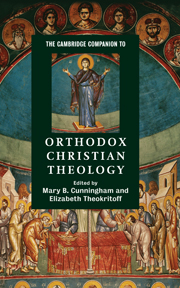Book contents
- Frontmatter
- Who are the Orthodox Christians? A historical introduction
- Part I Doctrine and Tradition
- 1 Scripture and tradition in the Church
- 2 Biblical interpretation in worship
- 3 God in Trinity
- 4 Creator and creation
- 5 The human person as image and likeness of God
- 6 Christ and salvation
- 7 Eschatology
- 8 The Church
- 9 Theology of the icon
- 10 The spiritual way
- Part II Contemporary Orthodox Theology: its Formation and Character
- Glossary
- Bibliography
- Index
- Series list
10 - The spiritual way
from Part I - Doctrine and Tradition
Published online by Cambridge University Press: 28 March 2009
- Frontmatter
- Who are the Orthodox Christians? A historical introduction
- Part I Doctrine and Tradition
- 1 Scripture and tradition in the Church
- 2 Biblical interpretation in worship
- 3 God in Trinity
- 4 Creator and creation
- 5 The human person as image and likeness of God
- 6 Christ and salvation
- 7 Eschatology
- 8 The Church
- 9 Theology of the icon
- 10 The spiritual way
- Part II Contemporary Orthodox Theology: its Formation and Character
- Glossary
- Bibliography
- Index
- Series list
Summary
INTRODUCTION: FROM THEOSIS TO ASCESIS
It has become fashionable, for Orthodox and non-Orthodox alike, to be infatuated with characteristic, even exotic, technical terms that define essential dimensions of Orthodox theology and spirituality. Scholars and students alike are generally enchanted, even distracted by the mystical or mysterious implications of such concepts as the way to theosis (namely, deification or divinisation), prayer of the heart (or the Jesus Prayer) and the vision of divine light. It may, therefore, be helpful to offer from the outset certain terminological clarifications of key theological concepts, mystical principles and spiritual practices as these translate into Orthodox life. Indeed, the term 'spirituality' itself assumes numerous meanings, being either loosely adopted sometimes or else completely dismissed at others. Some Orthodox theologians are quick to claim that there is no reference in the classical tradition to 'spirituality' as such and rightly emphasise the connection between the Spirit of God and the spiritual life. There is no doubt that the word 'spirituality' itself is vulnerable to misunderstanding and misuse unless carefully 'unpacked' and nuanced. Nevertheless, words communicate the pregnancy of divine life when we approach them in a spirit of humility and with a sense of awe. It is not surprising, then, to find that the literary classics of the early Church, and particularly of the early Egyptian and Palestinian desert, underline the rigorous discipline involved in personally appropriating, rather than merely arbitrarily describing, the spiritual way. In this regard, they prefer to speak more about ascesis, rather than about theosis.
- Type
- Chapter
- Information
- The Cambridge Companion to Orthodox Christian Theology , pp. 150 - 164Publisher: Cambridge University PressPrint publication year: 2008
- 2
- Cited by



